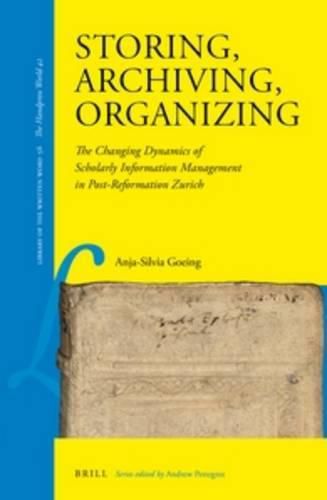Readings Newsletter
Become a Readings Member to make your shopping experience even easier.
Sign in or sign up for free!
You’re not far away from qualifying for FREE standard shipping within Australia
You’ve qualified for FREE standard shipping within Australia
The cart is loading…






Storing, Archiving, Organizing: The Changing Dynamics of Scholarly Information Management in Post-Reformation Zurich is a study of the Lectorium at the Zurich Grossmunster, the earliest of post-Reformation Swiss academies, initiated by the church reformer Huldrych Zwingli in 1523. This institution of higher education was planned in the wake of humanism and according to the demands of the reforming church. Scrutinizing the institutional archival records, Anja-Silvia Goeing shows how the lectorium’s teachers used practices of storing, archiving, and organizing to create an elaborate administrative structure to deal with students and to identify their own didactic and disciplinary methods. She finds techniques developing that we today would consider important to understand the history of information management and knowledge transfer.
$9.00 standard shipping within Australia
FREE standard shipping within Australia for orders over $100.00
Express & International shipping calculated at checkout
Storing, Archiving, Organizing: The Changing Dynamics of Scholarly Information Management in Post-Reformation Zurich is a study of the Lectorium at the Zurich Grossmunster, the earliest of post-Reformation Swiss academies, initiated by the church reformer Huldrych Zwingli in 1523. This institution of higher education was planned in the wake of humanism and according to the demands of the reforming church. Scrutinizing the institutional archival records, Anja-Silvia Goeing shows how the lectorium’s teachers used practices of storing, archiving, and organizing to create an elaborate administrative structure to deal with students and to identify their own didactic and disciplinary methods. She finds techniques developing that we today would consider important to understand the history of information management and knowledge transfer.